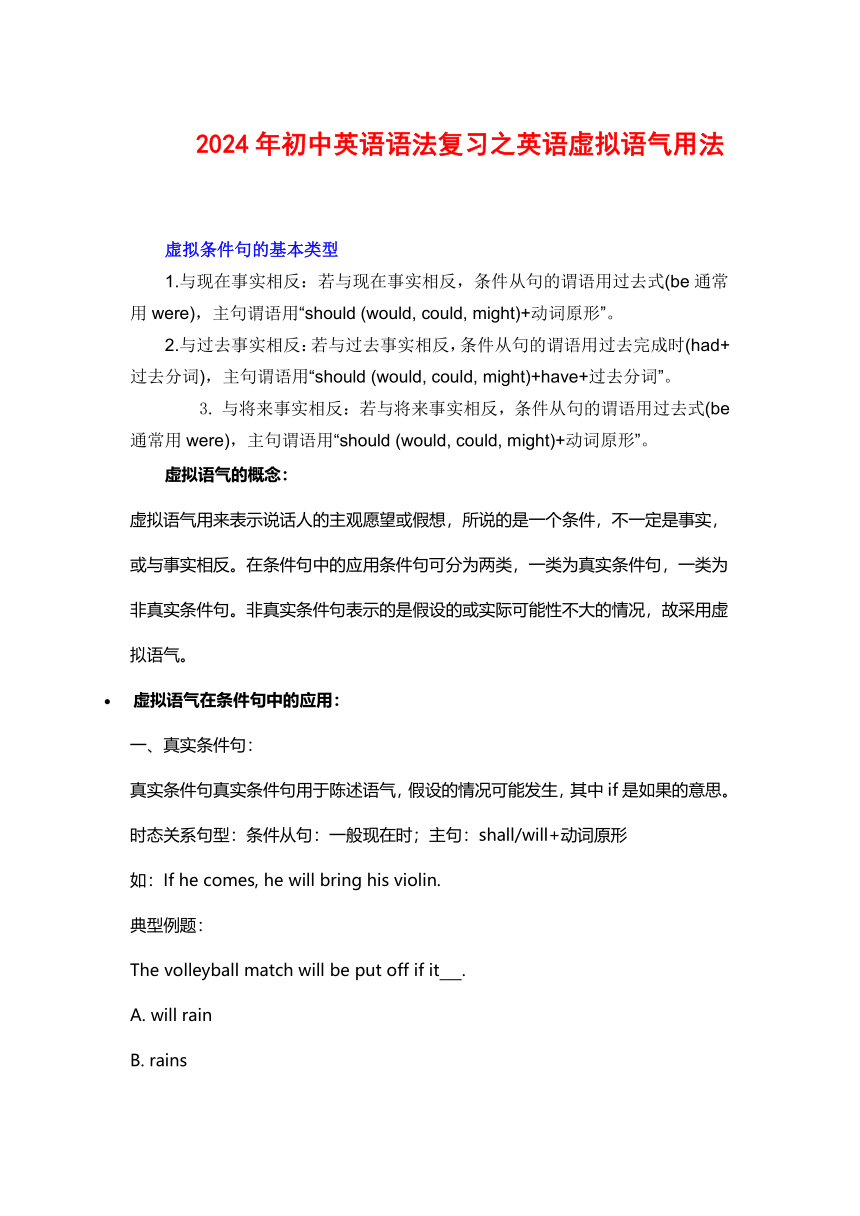
2024年初中英语语法复习之英语虚拟语气用法 虚拟条件句的基本类型 1.与现在事实相反:若与现在事实相反,条件从句的谓语用过去式(be通常用were),主句谓语用“should (would, could, might)+动词原形”。 2.与过去事实相反:若与过去事实相反,条件从句的谓语用过去完成时(had+过去分词),主句谓语用“should (would, could, might)+have+过去分词”。 3. 与将来事实相反:若与将来事实相反,条件从句的谓语用过去式(be通常用were),主句谓语用“should (would, could, might)+动词原形”。 虚拟语气的概念: 虚拟语气用来表示说话人的主观愿望或假想,所说的是一个条件,不一定是事实,或与事实相反。在条件句中的应用条件句可分为两类,一类为真实条件句,一类为非真实条件句。非真实条件句表示的是假设的或实际可能性不大的情况,故采用虚拟语气。 · 虚拟语气在条件句中的应用: 一、真实条件句: 真实条件句真实条件句用于陈述语气,假设的情况可能发生,其中if是如果的意思。 时态关系句型:条件从句:一般现在时;主句:shall/will+动词原形 如:If he comes, he will bring his violin. 典型例题: The volleyball match will be put off if it___. A. will rain B. rains C. rained D. is rained 答案:B。真实条件句主句为将来时,从句用一般现在时。 注意:1)在真实条件句中,主句不能用be going to表示将来,该用shall, will。 如: (错) If you leave now, you are never going to regret it. (对) If you leave now, you will never regret it. 2)表示真理时,主句谓语动词便不用shall(will)+动词原形,而直接用一般现在时的动词形式。 二、非真实条件句: 非真实条件句表示的是假设的或实际可能性不大的情况,故采用虚拟语气。 1)时态:可以表示过去,现在和将来的情况。它的基本特点是时态退后。 a. 同现在事实相反的假设。 句型:从句:一般过去时;主句:should(would)+动词原形 如:If they were here, they would help you. b.表示于过去事实相反的假设。 句型:条件从句:过去完成时;主句:should(would)have+过去分词 如:If she had worked harder, she would have succeeded. The rice would not have been burnt if you had been more careful. If my lawyer had been here last Saturday, he would have prevented me from going. c.表示对将来的假想句型: 条件从句:一般过去时;主句:should+动词原形 从句: were+不定式;主句:would+动词原形 should+动词原形 如:If you succeeded, everything would be all right. If you should succeed, everything would be all right. If you were to succeed, everything would be all right. 三、混合条件句: 主句与从句的动作发生在不同的时间,这时主,从句谓语动词的虚拟语气形式因时间不同而不同,这叫做混合条件句。 如:If you had asked him yesterday, you would know what to do now. (从句与过去事实相反,主句与现在事实相反。) If it had rained last night (过去), it would be very cold today (现在). · 比较if only与only if: only if表示“只有”;if only则表示“如果……就好了”。If only也可用于陈述语气。 如:I wake up only if the alarm clock rings. 只有闹钟响了,我才会醒。 If only the alarm clock had rung. 当时闹钟响了,就好了。 If only he comes early. 但愿他早点回来。 It is(high) time that It is(high) time that 后面的从句谓语动词要用过去式或用should加动词原形,但should不可省略。 如:It is time that the children went to bed. It is high time that the children should go to bed. ... ...
~~ 您好,已阅读到文档的结尾了 ~~